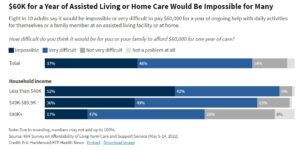Last week via a member news release from Leading Age Minnesota, the specter of federalized Assisted Living regulation popped up. Per this release, legislation enabling federal assisted living regulation of some form is anticipated to be proposed by U.S. Senator Mark Kelly (D-AZ) prior to the year’s end.
The primary outcome of what Senator Kelly is proposing is the creation of an Assisted Living Advisory Council at the federal level
to develop best practices for the operation of assisted living communities. At present, Assisted Living is regulated state-to-state with some states having fairly in-depth regulations and others, minimal regulation. A solid resource on the regulatory framework including state by state summaries, survey timeframes, contact information, etc. is available here Federal and State Nursing Home and Assisted Living Regulations | SeniorLiving.org
Kelly’s proposed legislation aims to set up an Assisted Living Advisory Council tasked with recommending best practices for assisted living facilities. It would also initiate a voluntary reporting process for these communities to disclose their adherence to the recommendations and establish an online dashboard for consumers to access these performance reports. The bill is referred to as ASSISTED in Assisted Living Act (Advancing Supportive Services, Information Sharing, and Transparency for Evidence-informed Decisions in Assisted Living Act).
LeadingAge (trade association representing primarily non-profit senior living and senior housing providers) and the American Seniors Housing Association received the legislation drafts. The American Senior Housing Association comments are available here Sen-Kelly-AL-draft-bill120224 .
What appears to be driving this initiative (Kelly’s legislative proposal) is his participation on the Senate Special Committee on Aging which has been engaged in reviewing the industry since early 2024. The engagement began after a series of negative news reports on industry deaths, abuses, and neglect ( https://rhislop3.com/2023/12/18/washington-post-and-assisted-living-not-so-good-news/ ) plus issues pertaining to pricing and transparency Extra Fees Drive Assisted Living Profits – KFF Health News.

During the January hearing at which the review was announced, Kelly described the incidents of physical and sexual abuse against residents that were reported by an Arizona media outlet as “horrifying”. The Senate Aging Committee often utilizes its authority to scrutinize private companies when potential health and safety issues or financial risks to older adults emerge. Although it is a special committee, it does not possess legislative authority.
The Assisted Living industry and trade groups has remained staunch in its belief that the most effective efforts for Assisted Living regulation and in turn, best practices should remain at the state/local level. In 2003 in response to a report and request from the US Senate Special Committee on Aging, The Center for Assisted Living Excellence (CEAL) launched as a national collaborative to promote excellence in assisted living nationwide. CEAL would act as on-going effort at the national level to review, research, evaluate and validate methods that will promote quality in assisted living.
In a further initiative to enhance quality in assisted living, Argentum, LeadingAge, ASHA, and NCAL collaborated with the National Association for Regulatory Administration in June 2023 to establish the Quality in Assisted Living Collaborative. This group aims to create industry guidance and resources for operators, regulators, policymakers, and other stakeholders. They have recently published best practices for infection prevention and control in assisted living communities, despite the lack of endorsement from NCAL.
A decade ago, the assisted living industry was subject to federal scrutiny when multiple senators requested a report from the Government Accountability Office on Medicaid oversight and the quality of care in assisted living communities. This request, submitted in 2015, culminated in a GAO report in 2018.
While the report primarily served as an action item list for the Centers for Medicare & Medicaid Services regarding the state reporting of care deficiencies and services to Medicaid recipients in assisted living communities, it prompted some federal lawmakers and consumer advocates to advocate for reforms in assisted living.
Sen. Kelly’s legislation has yet to be introduced. If it does in fact, go forward, it has little likelihood of passage under a Trump Administration that has promised to decrease regulation, not further it. Personally, I have not seen beneficial outcomes from new regulation in any post-acute care segment, but I have seen increased costs and additional provider frustration. What is clear to me is that care improvement comes via greater transparency and knowledge on the part of the consumer, not via additional federal regulation.